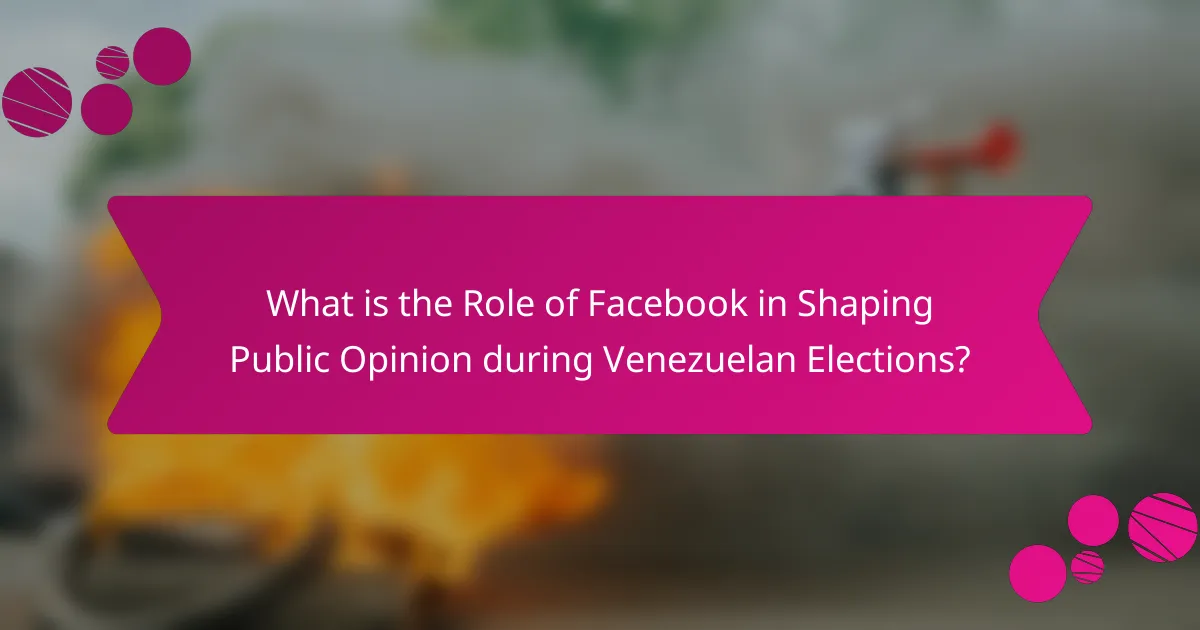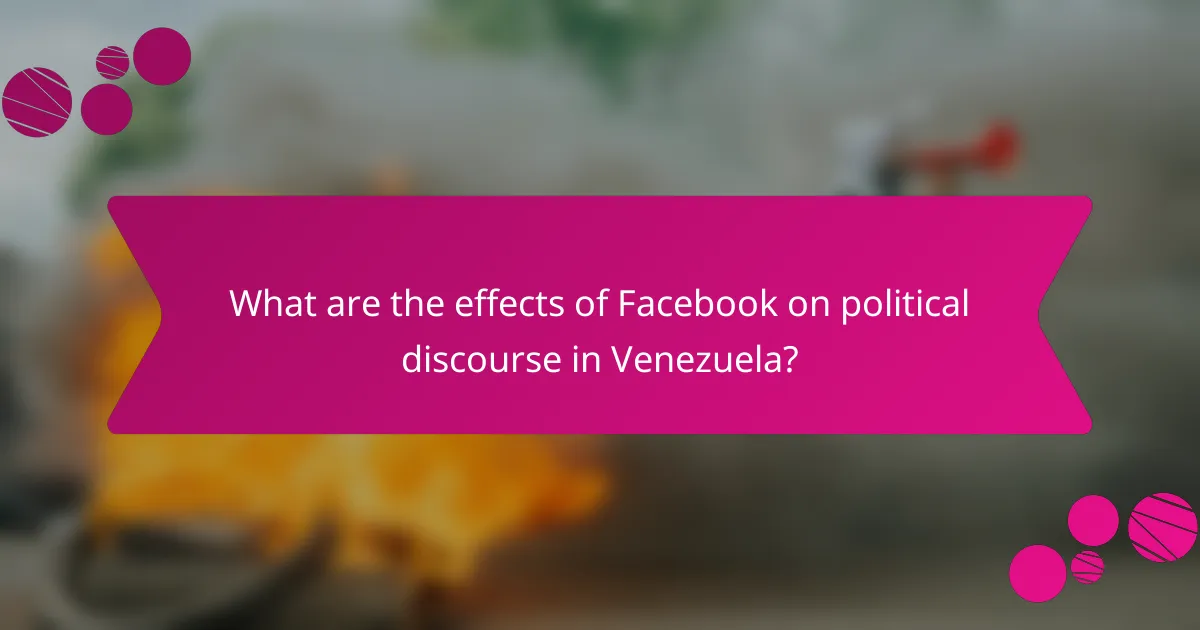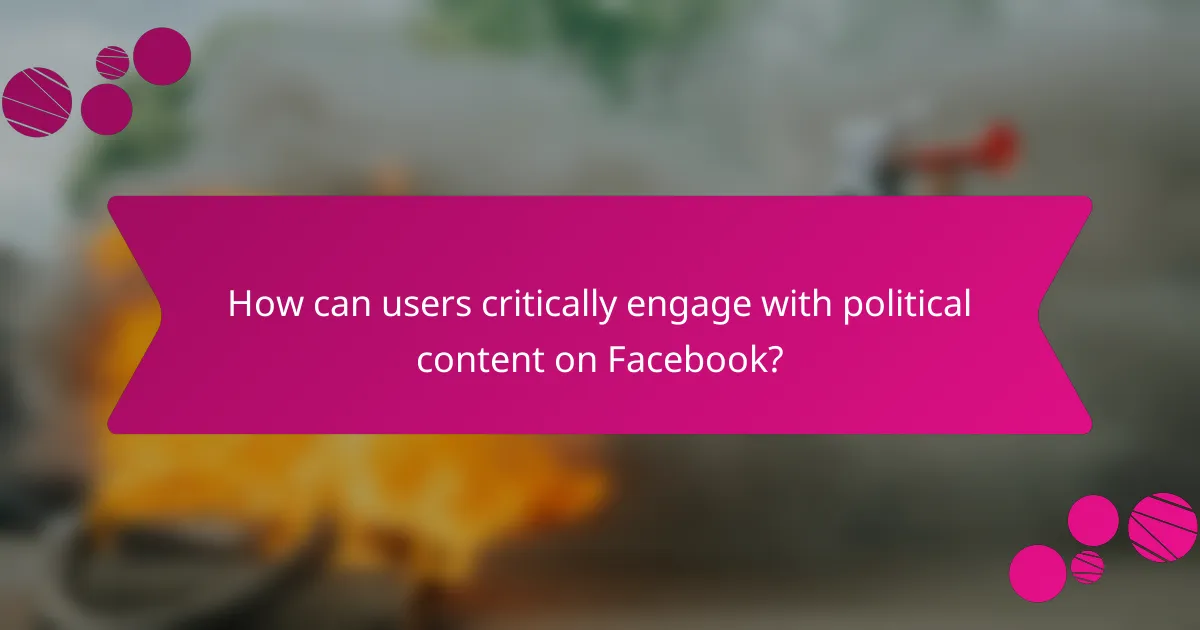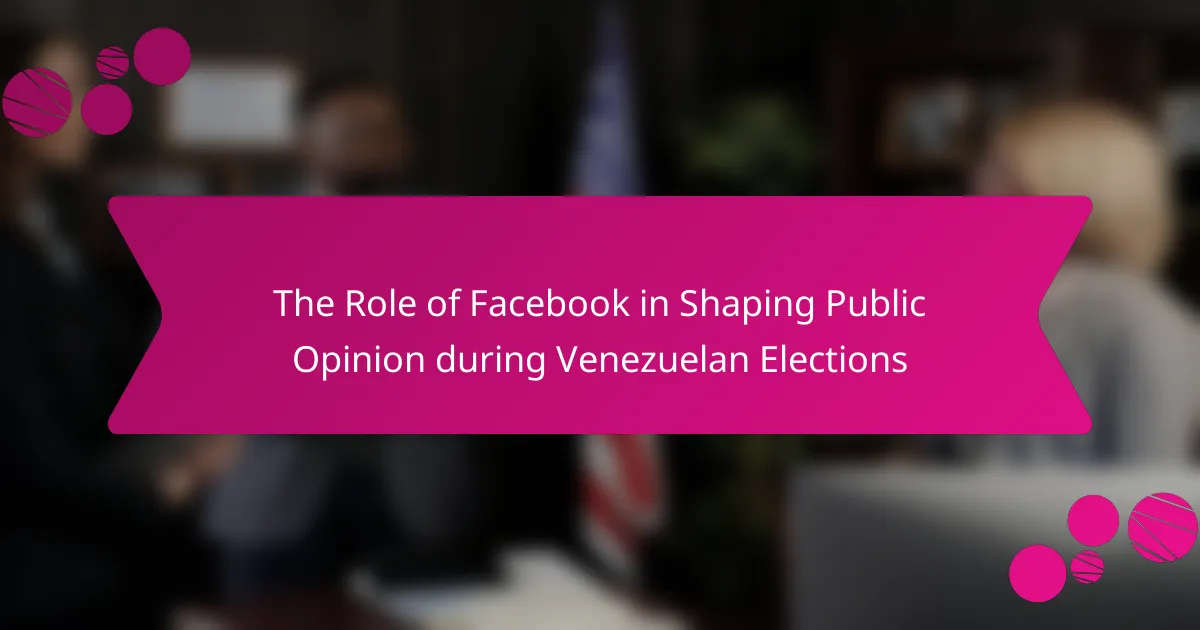
What is the Role of Facebook in Shaping Public Opinion during Venezuelan Elections?
Facebook plays a significant role in shaping public opinion during Venezuelan elections. The platform serves as a primary source of information for many voters. It facilitates the dissemination of political messages and campaign advertisements. Users engage with content that influences their perceptions of candidates and issues. Data from the 2018 presidential election indicated that social media usage surged, with Facebook being the most utilized platform. Political actors leverage Facebook for targeted advertising to sway undecided voters. Misinformation also spreads rapidly on Facebook, impacting voter sentiment. Studies show that social media can amplify polarization among the electorate. Overall, Facebook’s influence is profound in the context of Venezuelan electoral politics.
How has Facebook been utilized in previous Venezuelan elections?
Facebook has been utilized as a key platform for political campaigning in previous Venezuelan elections. Candidates and political parties have leveraged Facebook to reach a wide audience. They share campaign messages, political ads, and engage with voters directly. Facebook allows for targeted advertising based on user demographics and interests. This targeting has been crucial in mobilizing support among specific voter groups. During the 2013 presidential election, for instance, social media campaigns played a significant role in shaping public perception. The platform also served as a space for political discourse and debate among citizens. Facebook’s algorithms influence the visibility of political content, impacting voter awareness. Overall, Facebook has been an essential tool in the electoral strategies of Venezuelan politicians.
What specific features of Facebook influence public opinion?
Facebook’s algorithmic news feed influences public opinion by prioritizing engaging content. This feature determines what users see based on interactions, promoting sensational posts. The platform’s ability to create echo chambers reinforces users’ existing beliefs. Facebook groups facilitate community discussions, shaping collective viewpoints. Targeted advertising allows political messages to reach specific demographics effectively. User-generated content can sway opinions through personal narratives. Additionally, the sharing feature amplifies messages rapidly across networks. These features collectively impact how information is perceived and disseminated during events like Venezuelan elections.
How do Facebook algorithms impact the visibility of political content?
Facebook algorithms determine the visibility of political content by prioritizing engagement metrics. Content that generates more likes, shares, and comments is more likely to appear in users’ feeds. This prioritization can lead to echo chambers, as users see more of what aligns with their views. Political content that sparks debate or controversy tends to gain higher visibility. In contrast, less engaging content may be suppressed, limiting its reach. Research shows that algorithm-driven visibility can influence public opinion significantly. For example, a study by the Pew Research Center found that 64% of Americans believe social media has a major impact on their political views. This highlights the role algorithms play in shaping political discourse on Facebook.
Why is Facebook’s role significant in the context of Venezuelan politics?
Facebook plays a significant role in Venezuelan politics by facilitating communication and mobilization among citizens. The platform serves as a primary source of news and information, especially in a context where traditional media is heavily censored. During election periods, Facebook enables political parties and candidates to reach voters directly. It allows for targeted advertising and engagement strategies that can influence public opinion. Data shows that a substantial portion of the Venezuelan population uses Facebook as their main news source. This digital engagement can shape electoral outcomes and public discourse. The platform’s algorithms can amplify certain narratives, impacting political awareness and participation.
What are the implications of social media on voter behavior in Venezuela?
Social media significantly influences voter behavior in Venezuela. It serves as a platform for political discourse and mobilization. Many Venezuelans use social media to access news and opinions about candidates. This access can shape their perceptions and voting decisions. The 2018 presidential elections highlighted this trend. Social media campaigns targeted younger voters, who are more active online. Research indicates that social media can enhance political engagement. A study by the University of the Andes found that 60% of voters relied on social media for election information. This reliance indicates a shift in traditional media consumption. Social media can also spread misinformation, potentially distorting voter perceptions. Overall, social media plays a crucial role in shaping electoral outcomes in Venezuela.
How does Facebook compare to traditional media in shaping public opinion?
Facebook shapes public opinion differently than traditional media. It allows for real-time engagement and interaction. Users can share opinions and content instantly. This creates a participatory environment. Traditional media, like newspapers and television, offers a one-way communication model. It typically delivers pre-packaged information to audiences. Research indicates that social media can amplify certain viewpoints. A study by the Pew Research Center found that 62% of adults get news from social media. This contrasts with the declining trust in traditional media sources. In Venezuela, Facebook has been crucial for political mobilization. It provides a platform for grassroots movements. This dynamic is less prevalent in traditional media channels.
What challenges does Facebook face in influencing public opinion during elections?
Facebook faces challenges in influencing public opinion during elections due to misinformation and algorithm biases. Misinformation can spread rapidly on the platform, leading to confusion among voters. In the context of Venezuelan elections, false narratives can undermine trust in the electoral process. Additionally, Facebook’s algorithms prioritize engagement over accuracy, which can amplify polarizing content. This creates echo chambers that reinforce existing beliefs rather than fostering informed discussions. Regulatory scrutiny also poses a challenge, as governments may impose restrictions on how Facebook operates during elections. These factors collectively hinder Facebook’s ability to effectively shape public opinion in a balanced manner.
What issues related to misinformation arise on Facebook during elections?
Misinformation on Facebook during elections can lead to significant issues. False narratives can spread rapidly, influencing voter perceptions. This misinformation often includes fabricated news stories and misleading statistics. Additionally, echo chambers can reinforce existing biases among users. A study by the Pew Research Center found that 64% of Americans believe misinformation causes confusion about basic facts. This confusion can ultimately affect voter turnout and decision-making. Furthermore, algorithms may prioritize sensational content, exacerbating the spread of false information. These factors collectively undermine the integrity of the electoral process.
How does Facebook address concerns about political advertising?
Facebook addresses concerns about political advertising through transparency measures and policy enforcement. It requires advertisers to disclose their identity and the source of funding for political ads. Facebook also maintains an Ad Library that allows users to view all active political ads and their funding details.
In addition, Facebook employs third-party fact-checkers to review political content. This helps to identify misinformation and reduce the spread of false claims. The platform also implements stricter guidelines for ad targeting to prevent manipulation.
These actions are part of Facebook’s commitment to maintaining electoral integrity. They aim to build trust with users and ensure a fair political advertising environment.
How do different demographics engage with Facebook during Venezuelan elections?
Different demographics engage with Facebook during Venezuelan elections in varied ways. Younger users primarily utilize the platform for news and political discussions. They often share content and participate in online activism. Older demographics tend to use Facebook more for connecting with family and friends. They may consume news but engage less with political content.
According to a study by the Venezuelan Institute of Data Analysis, 70% of users aged 18-34 reported using Facebook for political information. In contrast, only 30% of users aged 50 and above indicated the same. Additionally, urban residents show higher engagement levels compared to rural populations.
Urban users often follow political pages and participate in discussions. Rural users may have limited access, affecting their overall engagement. This demographic divide highlights the influence of age and location on Facebook usage during elections.
What role does age play in Facebook usage for political information?
Age significantly influences Facebook usage for political information. Younger users tend to engage more frequently with political content on Facebook. They often seek information from social media rather than traditional news sources. In contrast, older users typically rely on established media outlets for political news. A study by the Pew Research Center found that 64% of adults aged 18-29 use Facebook for news, compared to only 38% of those aged 50 and older. This generational difference highlights how age shapes preferences for political information sources. As a result, age impacts the effectiveness of Facebook as a tool for political engagement during elections.
How do socio-economic factors influence Facebook engagement in elections?
Socio-economic factors significantly influence Facebook engagement in elections. Individuals with higher income and education levels tend to engage more on social media platforms. They are more likely to share political content and participate in discussions. Conversely, lower-income individuals may have limited access to technology and the internet. This can reduce their engagement on platforms like Facebook. Additionally, socio-economic status affects political interest and awareness. Research shows that wealthier demographics are more inclined to follow political news online. This engagement can impact voter turnout and opinions during elections.

What are the effects of Facebook on political discourse in Venezuela?
Facebook significantly influences political discourse in Venezuela. It serves as a platform for political engagement, allowing users to express opinions and mobilize support. The platform facilitates the rapid spread of information, including news and political commentary. This can lead to increased political polarization among users. Misinformation and propaganda often circulate, impacting public perception of political events. Research indicates that social media, including Facebook, plays a crucial role in shaping electoral outcomes. A study by the Pew Research Center highlights that Venezuelans increasingly rely on social media for news. This reliance can distort the political landscape, as users may encounter biased information. Overall, Facebook’s effects on political discourse in Venezuela are profound and multifaceted.
How does Facebook facilitate political mobilization among voters?
Facebook facilitates political mobilization among voters by providing a platform for information sharing and community engagement. It allows users to connect with like-minded individuals and organizations. The platform enables the dissemination of campaign messages and political content rapidly. Facebook’s targeted advertising tools help campaigns reach specific demographics. Events can be organized and promoted through Facebook, increasing participation. Groups and pages dedicated to political causes foster discussion and rally support. According to a study by the Pew Research Center, 69% of adults in the U.S. reported using Facebook for political information. This indicates its significant role in shaping political awareness and mobilization.
What strategies do political parties use on Facebook to engage voters?
Political parties use targeted advertising, interactive content, and community engagement strategies on Facebook to engage voters. They utilize targeted ads to reach specific demographics, ensuring messages resonate with key voter groups. Interactive content, such as polls and quizzes, encourages participation and feedback from users. Community engagement is fostered through regular updates and direct communication with followers. Additionally, parties leverage Facebook Live for real-time interactions, enhancing transparency and accessibility. These strategies have been effective in mobilizing voter participation, as evidenced by increased engagement metrics during election periods.
How effective are Facebook campaigns in reaching target audiences?
Facebook campaigns are highly effective in reaching target audiences. They utilize advanced targeting options based on user demographics, interests, and behaviors. Studies show that Facebook ads can increase brand awareness by up to 80%. Additionally, 1.8 billion users log onto Facebook daily, providing a vast potential audience. Data indicates that 74% of marketers believe Facebook is the most effective social media platform for advertising. Targeting capabilities allow advertisers to focus on specific geographic areas and interests. This precision leads to higher engagement rates compared to traditional advertising methods. Overall, Facebook campaigns significantly enhance the ability to connect with desired audiences.
What are the consequences of Facebook’s influence on public opinion?
Facebook’s influence on public opinion can lead to polarization and misinformation. It shapes perceptions through targeted advertising and algorithm-driven content. Users often encounter echo chambers that reinforce existing beliefs. This can diminish exposure to diverse viewpoints. During the Venezuelan elections, Facebook’s role amplified political narratives. Misinformation spread rapidly, affecting voter behavior. Studies show that social media can sway electoral outcomes. For instance, a 2018 study by the Pew Research Center found that 64% of Americans believe social media has a significant impact on political views.
How has Facebook changed the landscape of political discussions in Venezuela?
Facebook has significantly transformed political discussions in Venezuela. It has become a primary platform for political engagement and debate. Citizens utilize Facebook to share news, opinions, and mobilize support for political movements. The platform facilitates real-time communication among users, allowing for rapid dissemination of information. This has led to increased political awareness and activism among the population. Additionally, Facebook has been used to organize protests and political campaigns. The platform’s algorithms influence what content users see, shaping public perception and discussion. In summary, Facebook has altered the political landscape by enhancing communication, mobilization, and information sharing in Venezuela.
What are the risks associated with Facebook’s role in elections?
Facebook’s role in elections poses several risks. Misinformation can spread rapidly on the platform. This misinformation can influence voter perceptions and decisions. The platform’s algorithms may favor sensational content over factual reporting. This can distort public discourse and undermine democratic processes. Additionally, the potential for targeted political advertising raises concerns about transparency. Ads may be tailored to specific demographics without proper oversight. This can lead to manipulation of voter behavior. Furthermore, the platform can be exploited by foreign entities to interfere in elections. These risks collectively threaten the integrity of electoral processes.

How can users critically engage with political content on Facebook?
Users can critically engage with political content on Facebook by analyzing the source of the information. They should verify the credibility of the pages or profiles sharing the content. Users can also check for citations and references within the posts. Engaging with diverse perspectives enhances understanding. Commenting on posts can foster discussion and reveal biases. Users should report misleading content to promote accountability. Fact-checking websites can provide additional context and verification. These actions empower users to navigate political discourse effectively.
What strategies can voters use to identify credible information on Facebook?
Voters can use several strategies to identify credible information on Facebook. First, they should verify the source of the information. Credible sources often have established reputations and can be checked against recognized news outlets. Second, voters should look for citations or references within the posts. Credible information typically links to original articles or studies. Third, cross-referencing information with multiple sources is essential. If the same information appears across various credible platforms, it is more likely to be accurate. Fourth, voters should be cautious of sensational language or emotional appeals. Reliable information tends to maintain a neutral tone. Additionally, checking the publication date is important, as outdated information may no longer be relevant. Finally, voters can utilize fact-checking websites to confirm claims made in Facebook posts. These strategies can help voters discern credible information amidst the vast content available on Facebook.
How can users differentiate between reliable and unreliable sources?
Users can differentiate between reliable and unreliable sources by evaluating several key factors. Reliable sources typically have established credibility, such as academic institutions or recognized news organizations. These sources often provide citations and references to support their claims. Unreliable sources may lack transparency in authorship or fail to provide evidence for their information.
Additionally, users should check the publication date to ensure the information is current. Fact-checking websites can also be utilized to verify claims made by a source. Consistency with information from multiple reputable sources further indicates reliability. Finally, the presence of bias or sensational language can signal an unreliable source.
What steps can users take to report misinformation on Facebook?
To report misinformation on Facebook, users can follow specific steps. First, they should locate the post containing the misinformation. Next, users can click on the three dots in the top right corner of the post. This action opens a menu with options. They should select “Find Support or Report Post.” Then, users can choose “False Information” as the reason for the report. After that, they can follow the prompts to submit their report. Facebook reviews these reports to determine if action is necessary. This process helps maintain the integrity of information shared on the platform.
What best practices should political candidates follow on Facebook?
Political candidates should engage authentically with their audience on Facebook. They must post regularly to maintain visibility and relevance. Transparency about their policies and intentions is crucial. Candidates should utilize targeted ads to reach specific demographics effectively. Engaging with comments fosters community and trust. Sharing multimedia content, like videos and images, increases engagement rates. Monitoring analytics helps refine strategies based on audience response. Lastly, candidates should address misinformation promptly to uphold credibility.
How can candidates create effective campaigns on Facebook?
Candidates can create effective campaigns on Facebook by utilizing targeted advertising and engaging content. They should define their audience using Facebook’s demographic tools. This allows them to reach specific voter segments. Creating compelling visuals and videos can enhance engagement rates. Regularly posting updates keeps the audience informed and involved. Candidates should also encourage interaction through comments and shares. Analyzing campaign performance with Facebook Insights helps refine strategies. Research shows that targeted ads can increase voter turnout by up to 20%.
What ethical considerations should candidates keep in mind when using Facebook?
Candidates should consider transparency when using Facebook for political communication. This means disclosing funding sources for advertisements. They should also avoid spreading misinformation. Misinformation can mislead voters and damage trust. Privacy is another critical consideration. Candidates must respect user data and comply with Facebook’s policies. Engaging in targeted advertising requires ethical scrutiny. This involves ensuring that ads do not exploit vulnerable populations. Additionally, candidates should be aware of the platform’s influence on public opinion. Facebook can amplify messages, which can lead to polarization. Ethical responsibility entails promoting constructive dialogue rather than division. These considerations are essential for maintaining integrity in political campaigning.
The main entity of this article is Facebook, specifically its role in shaping public opinion during Venezuelan elections. The article examines how Facebook serves as a critical platform for political campaigning, information dissemination, and voter engagement, highlighting its influence on electoral outcomes and public discourse. It discusses the platform’s features, such as targeted advertising and algorithm-driven content visibility, which impact user perceptions and behavior. Additionally, the article addresses the challenges posed by misinformation and the implications of social media on voter behavior, emphasizing the need for critical engagement with political content on Facebook.
